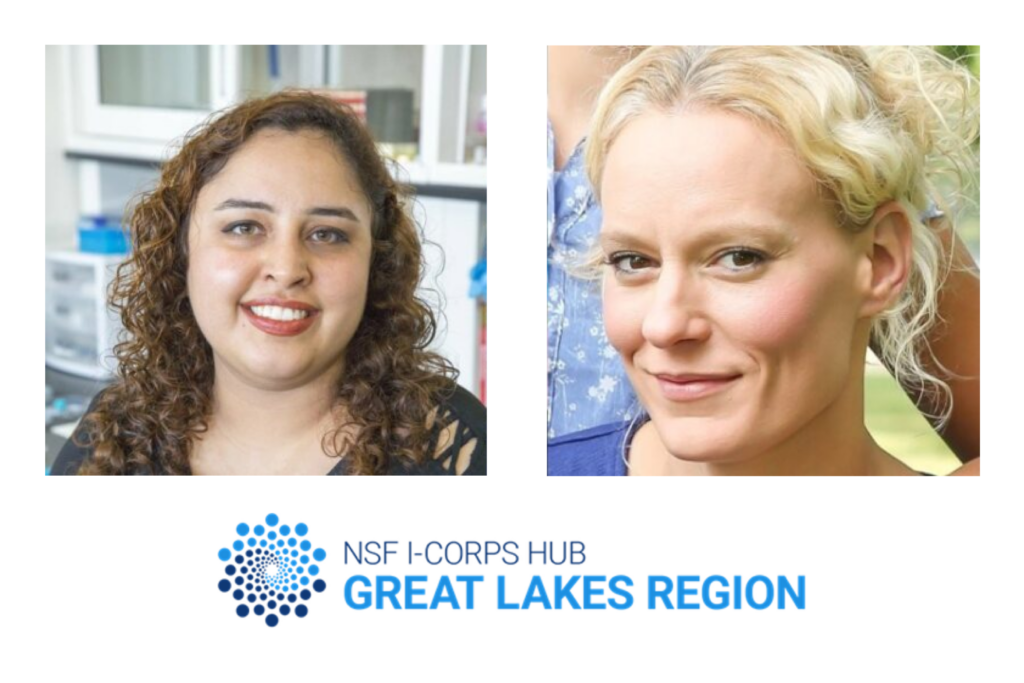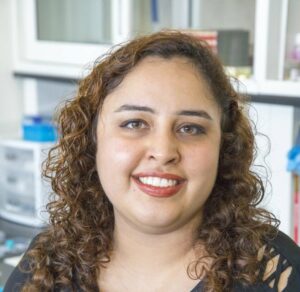
The NSF Innovation Corps Graduate Student Bootcamp works with a cohort of students with research topics of all varieties to get out of their comfort zones and engage with stakeholders via interviews focusing on identifying value propositions in their areas of expertise. Last year, the Summer 2021 cohort of 18 students completed 169 interviews in the span of a single week.
We asked two students from this cohort, Niloufar Yavarishad and Heather Pace, to share their experiences with this program with us. Read their responses below.

About Niloufar Yavarishad: “I have a bachelor’s degree in Physics and a master’s degree in Electrical Engineering. Currently I am a Ph.D. candidate in Electrical Engineering with a focus on Nanotechnology, electronic materials, and semiconductor devices.”
About Heather Pace: “I am a 3rd year Ph. D. physics student working in condensed matter. I have three cats and three kids. I split my time between our house in Oshkosh and our apartment here in Milwaukee. My current project is delving into how various properties of superconductors are altered when exposed to high energy radiation.”
Q: Please describe your project/startup/business and a brief background on it.
Niloufar Yavarishad: “Our everyday lives depend critically on our computers, smartphones, satellites, and fiber optic cables which help us communicate across large distances. This ability to sense, interact with ,and communicate with our environment is founded in advanced applications of the quantum mechanics of smart materials. My research involves in the study of new quantum materials called Dirac materials which have a unique quantum topology. When grown in nano forms, we find that these materials operate as excellent sensors of infrared light.”
Heather Pace: “Our ability to store reusable clean energy in small battery packages has fundamentally challenged the paradigm of a future energy economy powered by fossil fuels. Rechargeable Li-ion batteries have become ubiquitous in electronic devices, wireless communication, backup power, automation, and – more recently – vehicular motion. Li-ion batteries use Lithium and Cobalt – expensive and finite resources available to just a handful of countries. Their extraction is mired in issues of a vulnerable supply chain, potential geopolitical conflict, and ongoing human depravity that is often characteristic of mining of expensive resources. Our group has built and tested alternative battery formulations following the principles of recyclable Li-ion batteries but without the use of Lithium or Cobalt. Additional funding is needed in order to take this to the market. We are engaged in broader customer discovery using NSF I-Corps principles and testing the above value propositions in the actual marketplace.”
Q: What were your experiences like going through the I-Corps program?
Niloufar: “Starting the program, I was shy and not confident enough to start a conversation with a professional person/expert in industry and I had always been questioning myself if I can dare to talk to people and learn from their innovative experiences and journeys. During the program, I was guided by the I-Corps teaching team on how to start a conversation with people in companies and what kind of beneficial questions to ask them. I liked all the activities that we did during the I-Corps program, they were fun and informative and provided us with the tools for the real-world experiences. Finishing the program, I felt like I am a new person, a strong confident woman in engineering that can share her ideas with the world and test them and get help from other professionals. It was such a powerful experience for me.”
Heather: “It’s been very fun. I’ve enjoyed learning about other branches of science and the research currently being conducted at UWM.”
Q: How was your time with I-Corps beneficial to your innovative journeys?
Niloufar: “I have been at school for about 12 years for my undergraduate and graduate program and have not worked as an intern in a company, so in the beginning of the I-Corps program I did not know much about the industry environment and how to start a business. During I-Corps, I learned to expand my network and to reach out to people in LinkedIn or by email and interview them with questions to test my ideas and get information about how to improve my ideas and how to find potential customers. Through my conversations with professionals, I figured out that it is so easy to start a company while you are in academia, the only challenge is to make profit out of it and find the VCs and Angel investors. I feel like, now I know what‘s going on beyond the school and an academic environment and why we are learning some of the courses and how beneficial our research is. I am inspired by some of the people, especially women in engineering, that I was lucky to get to know and would like to start my own business someday.“
Heather: “I have loved my time with I-Corps. Before starting a Ph. D. in physics here at UWM, I worked in an engineering sales role. Before starting the program, I felt like much of the training and experience in my former career was not of benefit, but I-Corps has helped me see that my leadership and people skills are of value in my program. I-Corps has helped me feel more confident in myself and my abilities. The program also turned me on to an author, Adam Grant, which I very much appreciate.”
Q: Please share a fun fact about yourself.
Niloufar: “Most of the people around me consider me a funny girl. I do like stand-up comedies, and I use it during my serious teaching in my Analytical Techniques in Engineering class. Which is a pure mathematics and hard course. I make fun of myself or an incident that happened to me to make my students laugh and get their attention to learn ‘boring stuff,’ as they call it! So, yeah! I am a cool TA!”
Heather: “I am a crazy plant lady. My favorites are alocasia. I currently care for seven different species, with at least two more on the way.”